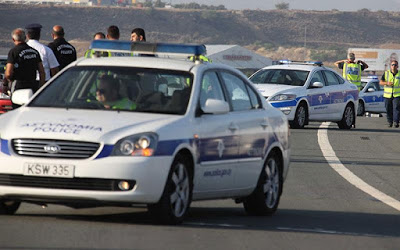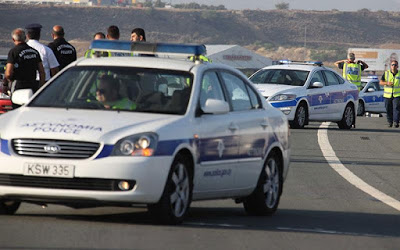Radical suggestions for reducing traffic accidents are being made by a study by the University of Cyprus, mainly focusing on tripling out-of-court settlements, increasing penalties for realistic drivers and especially for those who cause fatal accidents.
The study deals mainly with the field of prevention where suggestions are made, while it is noted that many things can not be achieved by increasing the sentences alone. In the study prepared by Andreas Kapardis, professor and president of the Law Department of the University of Cyprus and visiting professor of Cambridge University, the suggestion is made that along with the increase of sentences, targeted policing is done to prevent road collisions.
What is the current situation with the traffic in Cyprus and where is our country compared to the other 27 of the European Union?
In a Cyprus with limited public transport and a population of about 850.000, in 2014 we had a total of 229.834 people with driving licenses and 646.636 registered vehicles. As in Cyprus, road accidents, injuries and deaths on the asphalt are a scourge in Europe and worldwide. The number of road accidents and fatalities in Cyprus has decreased over time, but the number of deaths has increased both in a ratio of 1.000 accidents (it was 12,8 in 1982 and 39 in 2014) and in a ratio of 1.000 victims (it was 21,9 in 1982 and 40,4 in 2014). Even a human life to be saved must be an end in itself. Based on road deaths of one million people, in 2014 Cyprus was 12th among the 28 member states of the European Union, while Greece was one of the worst in 22nd place.
According to the Police, in the period 2011-2015 there were 6.562 accidents of which 259 (4%) fatal, 2.017 (31%) serious, 1.890 (29%) minor injuries and only 36% damage to the vehicle. During the same period there were 6.351 victims of which 268 (4%) died, 37% seriously injured and 59% with minor injuries. More than half (57%) of the dead motorcyclists and passengers did not wear a helmet and 64% of the dead and car passengers did not wear a seat belt.
What are the main causes of road collisions in Cyprus according to statistics?
The main causes of road accidents in the period 2011-2015 are driving under the influence of alcohol (27%), careless driving (23%), not driving on the left side of the road (14%), speeding (13%), careless driving pedestrian crossing (8,5%), driving under the influence of drugs (8,5%). During the same period, the Police reported 1.007.070 drivers, of which 45% for speeding, 8% for not wearing a seat belt, 8% for talking on a cell phone while driving and 4% for driving under the influence of alcohol. It should be noted, however, that road accidents decreased by 14% in 2007 with the use of photo-marking cameras in the period 11/10/2006 - 21/9/2007. Unfortunately, for some legal reason, the cameras were withdrawn in the fall of 2007.
What areas should the traffic reduction policy focus on, as the study shows?
A recent study by the University of Cyprus on traffic in Cyprus, the 3rd such study in the last ten years, in addition to the generative factors based on statistics and studies of the Cyprus Police as well as specialized scientific studies in Cyprus and abroad, also examined the ways traffic police, the existing penalties and how they compare with those of other countries such as Greece and England, the case law and the penalties imposed by the courts in Cyprus. International experience in road accident reduction demonstrates the need to invest in four main approaches: (a) targeted policing, (b) diversification of drivers based on the findings of specialized scientific studies of road behavior, (c) prevention through combination deterrent sentences and a high probability of detecting and punishing illegal drivers and (d) consolidating road conscience as part of a national strategy.
According to the research findings, targeted policing is one of the factors in reducing road collisions. How can it be implemented?
According to the Statistical Report of Road Traffic Collisions for the period 2010 - 2014 of the Analysis & Statistics Office (2015) of the Cyprus Police Headquarters, Pancyprian, 82% of these collisions were caused in residential areas (57% within cities), 38% were caused in secondary road network and 5% were caused on highways. In 2015, the respective percentages were 61%, 35% and 4%, showing some increase in urban road network conflicts. Based on these data and not only, the Police has recently adopted the approach of targeted traffic policing based on the possibility of a road collision. This means more investment in patrols and speed control in residential areas and on the secondary road network as well as in the well-known black spots. Unfortunately, however, the effectiveness of this approach is significantly limited by the absence of light-marking cameras on the streets of free Cyprus and the severe lack of staff in the Police, including the Traffic Departments.
What do we mean by differentiating drivers?
University studies in Cyprus and similar studies abroad have documented the fact that the age groups 18 - 21 and over 65, are high risk groups for different reasons. Young drivers, for example, are much more likely to misdiagnose the risk, to be overconfident as drivers, to drive faster than the speed limit, to drive late at night and under the influence of alcohol and / or drugs. For this reason in many countries young drivers are tested in the first three years after obtaining a driver's license and subject to stricter measures such as lower speed limits and stricter penalties when they break the law.
In court, instead of out of court
The following suggestions are made to improve the legal framework related to road collisions so that penalties are deterrent and more effective.
The recommendations concern, inter alia, the penalty points, the price of the extrajudicial fine per kilometer, drivers under surveillance, speed, driving under the influence of alcohol, driving under the influence of drugs, driving without a license, uninsured vehicles, helmet, seat belt, dangerous parking, one-handed use of mobile phone while driving, vehicle restraint, reckless / dangerous / reckless driving and training seminars for recurrent drivers. According to some suggestions:
(a) If a driver is driving on the motorway at a speed of 161 km / h or more than 30% of the permitted speed (120 km / h), no extrajudicial ruling should be issued but he / she should be taken to court for deprivation of the driver's license and a fine or penalty. imprisonment for up to 6 months.
(b) Legislate a category of Probationary / HR (supervised) drivers for a period of three years from the date of obtaining or re-obtaining the driving license.
(c) The supervised driver to be added as another category of drivers in Law 56 (1) / 2015 to which they belong to a lower limit of permissible alcohol.
(d) Article 210 of the Penal Code Chapter 154 to be amended immediately so that the maximum sentence for causing death by reckless, reckless or dangerous act is from four years that is currently ten (10) years.
When do Cypriots appear disciplined?
After all, what does the Cypriot driver need to be prudent and drive like when he is, for example, in the British bases?
According to the case law of the Supreme Court, prevention based on the principle of proportionality between the seriousness of a criminal offense and the punishment imposed, is the main purpose of imposing a sentence for the protection of the public. The term "deterrence" (ie I intimidate one of them from doing something by emphasizing the consequences if he does) refers to specific or individual deterrence (which targets the one who has committed and identified) and general deterrence that targets potential would-be offenders between public in general. General deterrence presupposes publicity of penalties imposed by the Police and the courts. But exemplary punishment alone has no effect if it is not combined with a general perception that the likelihood of someone being found guilty and severely punished is considerably higher. It is for this reason that it is no coincidence that Cypriot drivers comply with the speed limit when passing through areas of British bases or when driving in England or Germany or Australia for example.
Only 0,06% of offenders in prison
Only a very small percentage of those involved in road accidents or traffic offenses end up in prison. The most common penalty imposed by the courts is the fine, while the percentage of those drivers who do not have their driver's license is very small.
The question is reasonable, says Mr. Kapardis, what penalties are imposed by the courts in Cyprus for traffic offenses based on (a) the penalties at their disposal and (b) the case law of the Supreme Court regarding the purposes of punishment and mitigating and aggravating factors to be taken into account in sentencing? According to the latest available official data from the Statistical Service, in 2014 out of 28.962 convicted or admitted guilty of traffic offenses, 98% were fined, custody order 0,03%, imprisonment suspended 13 (0,03% ), imprisonment 22 (0,06%) and finally, 1,4% with bail or other treatment. Also, as mentioned above, the courts in 2014 deprived only 6,9% of drivers of their driving licenses. It is clear that the measures available to the courts need to be modernized in order to better deal with the phenomenon of road accidents.
Source: Liberal

